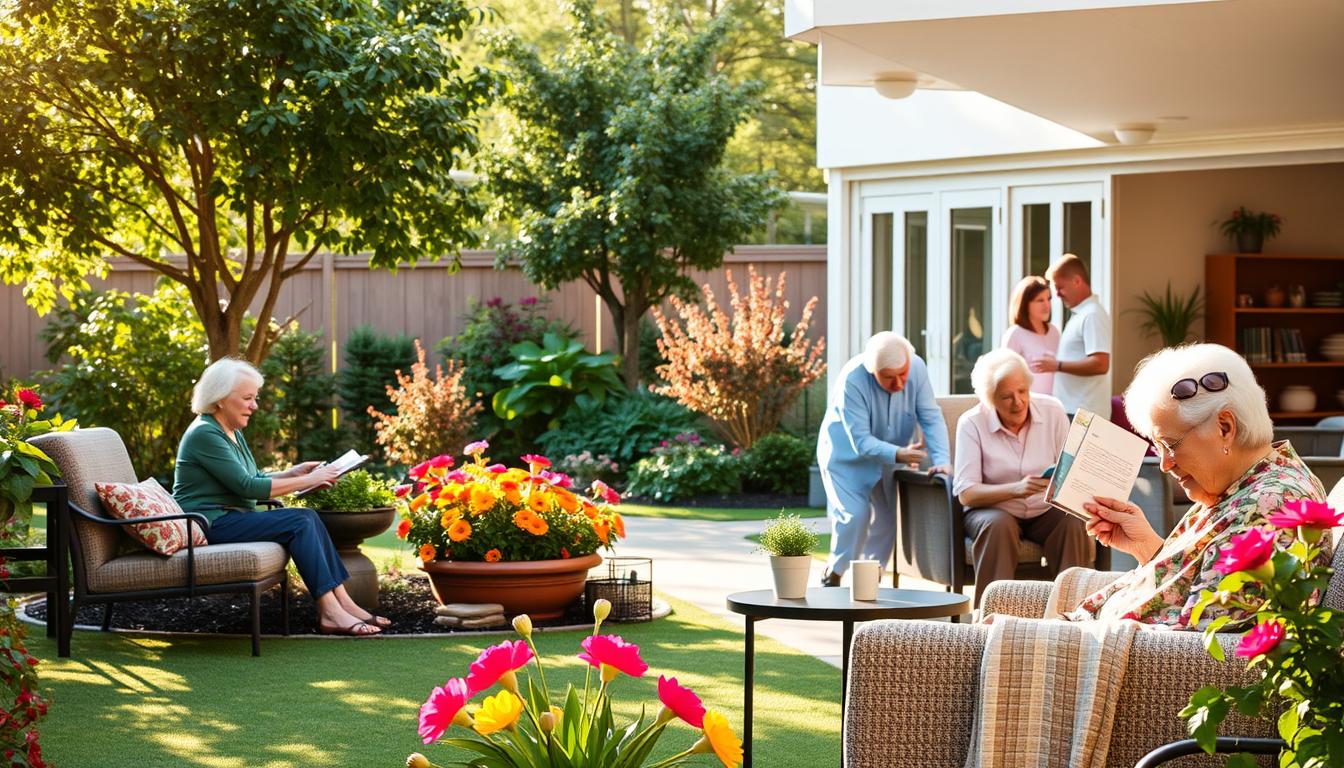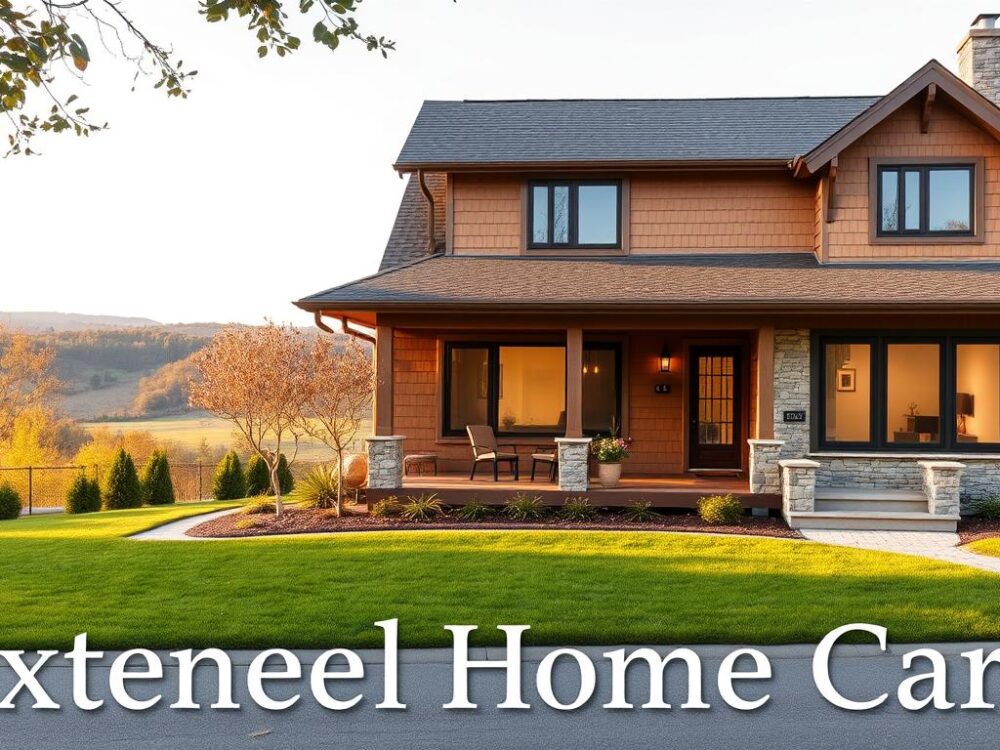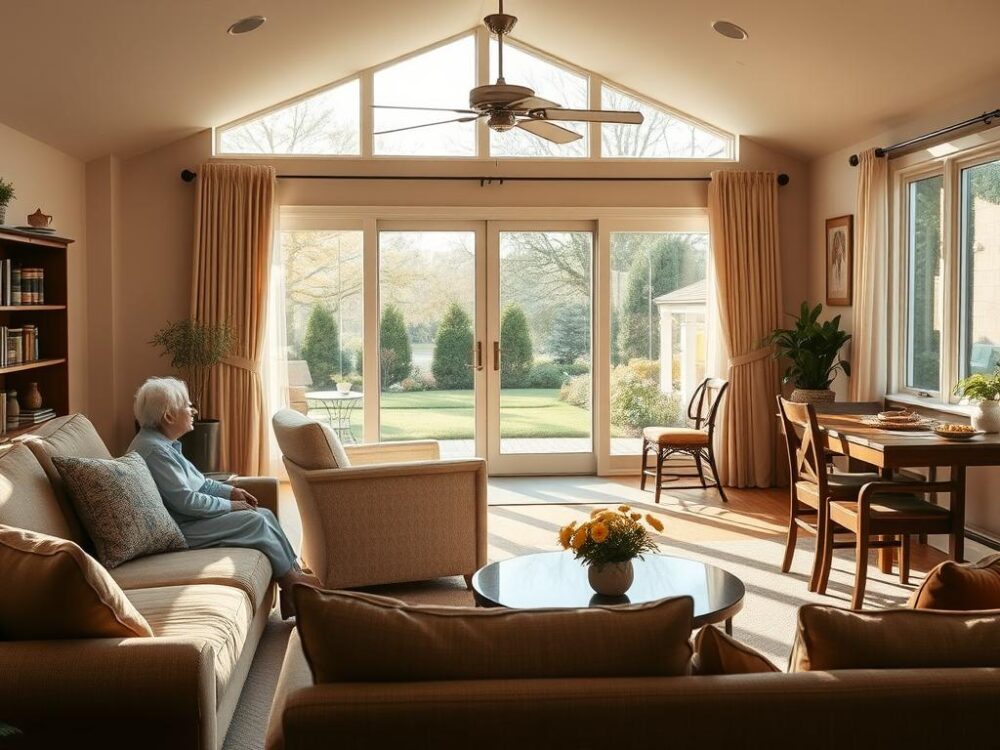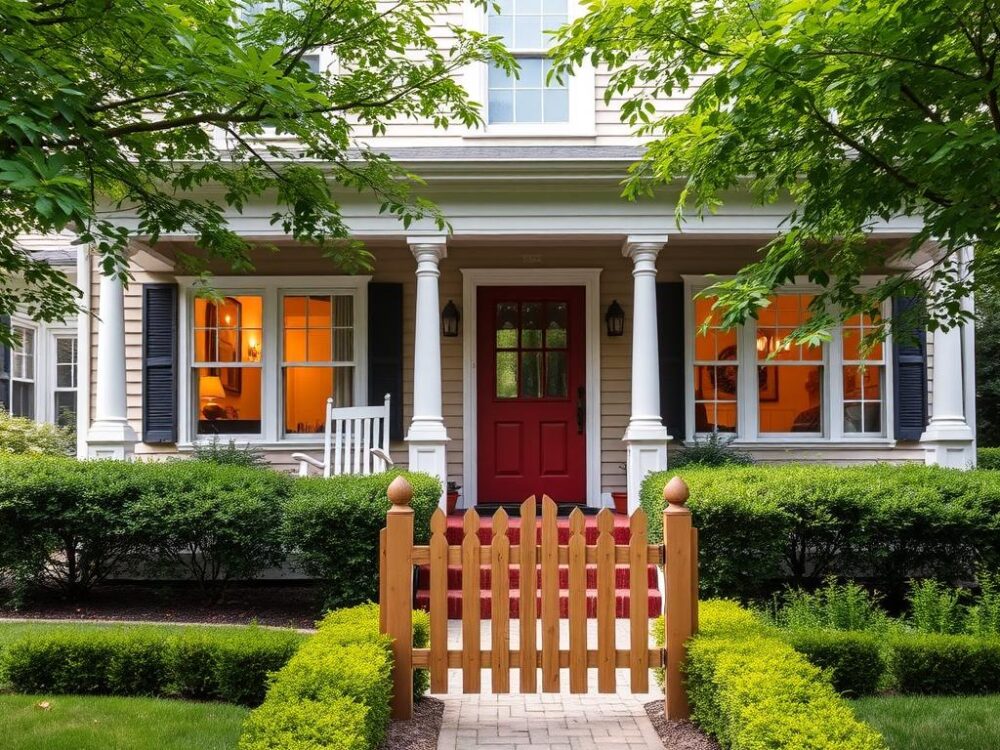
Comprehensive Aging Care Services for Seniors
October 2, 2024
Senior Health Care Services: Expert Support for Elders
October 2, 2024Did you know that 90% of adults over 65 want to stay in their homes as they age? This highlights the importance of comprehensive senior care for our ageing population. Understanding the options for seniors to live well is crucial.
Extended Home Care Services in Boston reflects the changing landscape of senior care. They offer various services, from quick visits to full-time care, catering to individuals of all ages. This flexibility addresses the diverse needs of seniors, emphasizing the importance of personalized support.
When exploring senior care, there is a focus on maintaining the independence and dignity of older adults.
This involves making home modifications and legal and financial planning. Understanding these options helps you make the best care choices for yourself or your loved ones.
Understanding Comprehensive Senior Care
Comprehensive senior care is a complete way to support older adults. It covers many areas to help them stay well and independent. This method understands that seniors need more than just medical care.
Definition and Importance
Geriatric support through comprehensive care offers many services. These include places for active seniors, support for daily needs, and care for those with memory issues. Geriatric support is vital because it changes with the seniors’ needs, ensuring they get the right care as they age.
Critical Components of Senior Care
Elder care management includes several important parts:
- 24-hour emergency response systems
- Transportation services
- Housekeeping and laundry help
- Meal preparation and nutrition support
- Social and recreational activities
These services help seniors in assisted living communities. They support their daily needs and keep them independent. Nursing homes provide more care, like help after surgery or heart issues.
Benefits for Aging Adults
Comprehensive senior care brings many benefits:
- Improved quality of life
- Enhanced safety and security
- Reduced risk of isolation
- Access to personalized care plans
Care facilities assess seniors’ needs to find the right support. They look at physical and mental health. This way, seniors get the right care and maintain their independence, dignity, and well-being.
Planning for Aging in Place
Planning for ageing in place is critical for seniors who want to stay independent. Over 75% of older adults want to remain in their homes as they age. To make this happen, you must assess your needs, modify your home, and consider legal and financial matters.
Assessing Current and Future Needs
First, evaluate your needs. Think about your health, mobility, and daily tasks. Many seniors need help with personal care, household chores, cooking, and getting around. In-home care services can help, letting seniors stay home longer.
Home Modifications for Safety and Accessibility
Making your home safe and easy to get around is vital. A safety check can spot dangers. You might need to:
- Install grab bars in bathrooms
- Put in slip-resistant floors
- Improve lighting
- Remove tripping hazards
These changes can make your home safer and more comfortable for seniors. It’s wise to check your home often as your needs change.
Legal and Financial Considerations
It’s essential to plan for the cost of ageing care services. You can use personal money, government programs like Medicare and Medicaid, or private insurance. Also, make advance directives and choose someone to make decisions for you.
Focusing on these areas can help you make a solid plan for ageing in place. This plan supports your independence and quality of life. Don’t forget that local resources and agencies can help a lot with this process.
Home-Based Care Services
Home-based care services help seniors stay independent in their homes. They offer personal care, household chores, meal prep, and medication management. Many seniors want to stay home, and these services make it possible.
Personal care includes bathing, dressing, and grooming. Household support includes cleaning, laundry, and grocery shopping. These services help seniors maintain their dignity and quality of life while getting the help they need.
Senior wellness is a big part of home-based care. Healthcare professionals work with care providers to keep seniors safe and independent at home. Some groups offer exceptional care for Alzheimer’s and Parkinson’s disease.
Home care can come from family and friends or professional caregivers. Medicare covers some short-term home health services. However, Medicaid and private insurance vary by state. Some long-term care insurance might help with costs.
When looking at home care, consider what you need and research your options. Adjusting to changes in independence takes time and patience. With the right support, ageing in place can be rewarding for many seniors.
Health Management for Seniors
Effective health management is critical for seniors. As we age, our health needs grow. To keep seniors well, we need an entire approach.
Chronic Disease Management
Managing chronic conditions is crucial for seniors. Coordination of care benefits 85% of older adults with complex medical conditions. This method covers all health aspects, improving quality of life.
Medication Management
Proper management is essential for seniors taking many medicines. It prevents bad drug reactions and ensures the right doses. Elder care often includes watching over medications and easing worries for seniors and their families.

Preventive Care and Wellness Programs
Preventive care is the base of senior wellness. Regular check-ups and screenings catch problems early. Many programs offer activities that keep seniors active and mentally sharp.
Professional care coordination boosts health and satisfaction. Services like telehealth let seniors talk to doctors anytime. Investing in health management today means a better tomorrow for seniors.
Assisted Living and Residential Care Options
As you age, your care needs may change. Assisted living and senior housing offer solutions when home-based care is insufficient. These retirement living options provide various levels of support to meet your unique needs.
Assisted living facilities house 25 to 100 residents and offer a balance of independence and support. These communities provide meals, housekeeping, and social activities. Nursing homes offer 24-hour supervision, meals, and rehabilitation services for those needing more intensive care.
Smaller-scale options include board and care homes, which usually accommodate 20 or fewer residents. These residential care facilities provide a more intimate setting while offering necessary support services.
For a comprehensive approach, consider Continuing Care Retirement Communities (CCRCs). These campuses offer a range of living options, from independent housing to skilled nursing care, allowing you to age in place as your needs evolve.
The cost of senior housing varies widely. Most people pay for assisted living out of pocket. Brookdale Senior Living, the largest senior living operator in the U.S., reports monthly rents for independent living ranging from $870 to $7,545. While Medicare generally doesn’t cover these costs, Medicaid may provide some coverage depending on your eligibility and state regulations.
Choosing the right senior housing option depends on your needs, preferences, and financial resources. With the older adult population expected to grow significantly by 2030, understanding these options is crucial for planning your future care.
Comprehensive Senior Care: Support Systems and Resources
As you get older, having a solid support system is vital to staying healthy and independent. Many resources are available to help seniors with their daily needs and improve their well-being.
Family and Caregiver Support
Family members are often the first line of support for seniors. In California, the Family Caregiver Services program helps by offering respite care, training, and counselling to family caregivers. This support is vital for keeping caregivers healthy and ensuring seniors receive quality care.
Community Resources and Programs
Your community likely has many ageing care services available. For instance, California’s CalFresh Healthy Living program focuses on nutrition and physical education for adults over 60. Many places also offer meal delivery services, which may be free or have a small fee.

Senior wellness programs are standard across the country. Health Promotion: Evidence-based programs aim to enhance the quality of life for older adults using proven methods. These programs often include fall prevention, nutrition education, and physical activity classes.
Government Assistance Programs
Government programs are essential for supporting seniors. Medicare covers some home health services, while Medicaid coverage varies by state. The Senior Community Service Employment Program (SCSEP) offers job training to adults over 55, paying at least the minimum wage during training.
Remember, resources like the Eldercare Locator can help you find local support services. Don’t hesitate to reach out and use these valuable resources to improve your life as you age.
Enhancing Quality of Life for Seniors
Improving the lives of older adults means meeting their physical, emotional, and social needs. Senior wellness programs are key in promoting active lifestyles and health. With the senior population set to triple by 2050, focusing on comprehensive care is crucial.
Mature adult care services are growing to meet demand. These services include personal care, meal prep, and companionship. They help seniors stay independent and maintain dignity. Caregivers also focus on nutrition, preparing meals that meet specific dietary needs.
Retirement living communities are now offering more activities. Social and recreational programs help fight loneliness and isolation, which are common in older adults. These communities provide:
- Physical fitness classes
- Art and craft workshops
- Educational seminars
- Social gatherings
Technology is changing senior care. Telemedicine brings healthcare to seniors in remote areas, and smart home technologies with IoT devices offer personalized care. These advancements improve care quality and reduce medical errors, enhancing seniors’ well-being.
Person-centred care models are becoming more popular in senior wellness. These models focus on individual preferences, values, and goals in elderly care. By focusing on personalized care, seniors can enjoy a better quality of life and make the most of their golden years.
Technology and Innovation in Senior Care
The world of senior care is changing fast with new tech. These changes are making life better for older adults and offering new ways to improve their quality of life.
Telehealth and Remote Monitoring
Telehealth is a significant change in senior care. It lets seniors talk to doctors from home. The COVID-19 pandemic made virtual care even more popular.
This shift helps seniors get care easier. It also saves money and makes them feel better.
Smart Home Technologies
Smart home tech is changing how we care for the elderly. Most seniors want to stay in their homes as they age, and new home tech lets them stay independent and comfortable.
This tech includes lights that turn on by themselves and voice assistants.
Assistive Devices and Wearables
Wearables and sensors are vital in caring for seniors. Small sensors can track a senior’s daily life, like when they take medicine. This info helps caregivers and doctors give better care.
But some seniors might not like new tech. They might prefer old ways of getting care. Tech needs to be easy to use, and seniors need to help make tech that helps them.
Navigating the Financial Aspects of Senior Care
Planning for retirement and senior care means considering different financial options. Senior housing costs can be high, with monthly fees ranging from $3,000 to $5,000.
Veterans and their spouses might get big help with these costs. The Aid & Attendance program gives up to $3,253 a month tax-free for those who served in specific wars. Yet, about 80% of veterans and their spouses don’t know about these benefits.
Understanding Medicaid is fundamental. In North Carolina, you must make less than $1,355 or $1,717 monthly for assisted living or memory care. Your total resources can’t be more than $2,000 if you’re single.
Most people pay for senior care themselves or with help from others. It’s smart to look at all your options early, including long-term care insurance and reverse mortgages. Groups like Patriot Angels can guide you through the complex systems, cutting down application time from 120 days to 30-45 days.
Knowing about these financial details helps you prepare for senior care costs. This way, you can enjoy a comfortable retirement.
Emotional and Mental Well-being in Aging
As you age, your emotional and mental health becomes very important. An excellent approach to care includes keeping your mind sharp and spirits high. Let’s look at how social activities, mental health support, and brain exercises can improve your later years.
Social Engagement and Activities
Being socially active is crucial for older adults. Join groups, volunteer, or spend time with family to avoid loneliness. About a quarter of older people face loneliness, which can harm their mental health.
Building social connections is essential for your health. 69% of older adults with heart issues reported better lives with social support.
Mental Health Support
Your mental health is essential at any age. If you’re feeling down, seek help – about 14% of adults over 60 have mental health issues. Counselling, support groups, and stress management can help a lot. Don’t be afraid to ask for help – it can significantly improve your life.
Studies show that social support significantly affects older adults’ well-being.
Cognitive Stimulation Programs
Stay mentally active to keep your mind sharp. Try memory games or puzzles, or learn something new. These activities can slow down brain decline and improve brain health.
Research shows that wisdom and resilience are vital to ageing well. Do activities that challenge your mind and help you grow. Remember, starting something new or learning a skill’s never too late.




